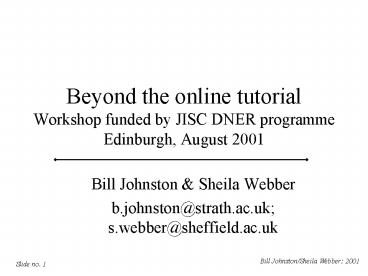Slide no. 1 - PowerPoint PPT Presentation
1 / 14
Title:
Slide no. 1
Description:
Students moaning because books aren't in the library ... Pragmatism. Doing well. Passing. Doing assignments. Passing exams. Preparing for courses ... – PowerPoint PPT presentation
Number of Views:52
Avg rating:3.0/5.0
Title: Slide no. 1
1
Beyond the online tutorialWorkshop funded by
JISC DNER programmeEdinburgh, August 2001
- Bill Johnston Sheila Webber
- b.johnston_at_strath.ac.uk s.webber_at_sheffield.ac.uk
2
Schedule
- Introductions
- Our view of the context
- Learning
- Group exercise part 1
- Lunch
- Information literacy
- Group exercise part 2
- Feedback
3
Librarians concerns
- Students moaning because books arent in the
library - Providing access to information in whatever
medium - Fairness, equity of access
- Organising
- Meeting performance standards, justifying
services - Making do with resources (time/money)
- Supporting institution e.g. for QAA
- Marketing the service
4
Academics concerns re information
- Students moaning because books arent in the
library - QAA
- Plagiarism
- Appropriateness of literature
- Right sources
- Reading lists
- Validity/authority
- Citation standards
- Focus on their subject, their students
- Research
5
Students concerns
Academic student deep approach
Non-academic student surface approach
Pragmatism
Doing well
Passing
Doing assignments Passing exams Preparing for
courses Preparing for work Having a good
time Surviving
Exploring the subject Expanding their knowledge,
understanding
6
Case study of using information
7
Implementation Students Resources, timetable
Learning design
Learning purposes
Teachers plan
Design of teaching learning
Evaluation/ redesign
Assessment of learning
Alignment Surface/ Deep
8
Some of my questions
- What do I have to do to (learn) about using it
- Will it be easily accessible to me, students (in
week X) - How much does it cost me
- Can I trial it
- Who will help me/students use it
- How can I incorporate it into my style of
learning teaching
9
- How might it be useful, what learning outcomes
does it enable/support e.g. - Using as information source - me/students
- Demonstrating, incorporating into teaching
sessions - As part of task for assignment, class exercise
etc.
10
Might use a news story ...
- Information for me for lecture presentation
- Part of reading list (print or electronic)
- Look at way story is told in different sources or
characteristics of different sources evaluating,
comparing (singly, in groups, in classroom, in
print, electronically) - (Whole source) as recommended as support for
assignment - student incorporating into report
etc.
11
Information literacy
- Growing interest in various countries
- Less developed in UK than in some others e.g.
USA, Australia (Government / institutional level) - Lots of definitions/ models
- Less work on how can be taught effectively to non
library information people
12
Academic influences in UK
- Dearing
- Subject benchmarks
- e-everything
- Internet use - search engines
- Plagiarism concerns
- May already be part of teaching
- JISC-funded projects
- Peoples concerns about their changing roles
13
IL topics
- Models of information literacy
- Models of information behaviour
- Characteristics/ types of information sources
- Search formulation, strategy, IR
- Information economy society
- Critical thinking, including critical thinking in
relation to information sources and services
14
Relevance?
- Another framework to help plan for packaging/
promoting resources to meet market needs - Maybe hook to academics and students current
concerns - May be on senior officers agenda (but IT focus?)
- Link to librarians existing/planned activities
- Dovetail with JISC/DNER aims































